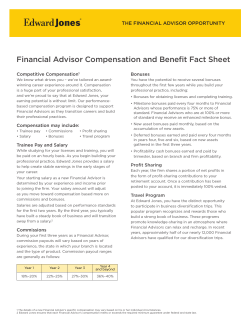
403(b) FAQ - May 2015 - St. Charles Community Unit School District
403(b)/457(b) Frequently Asked Questions Why 403(b) and 457(b) plans are important? 403(b) and 457(b) plans are both excellent ways to save money for retirement whether as a supplement to a traditional pension plan or other retirement plan(s), or as stand-alone plans. What is a 403(b)? A 403(b) is a tax deferred retirement plan available for certain employees of public schools employees of certain tax-exempt organizations, and certain ministers. A 403(b) has often been referred to as a Tax Deferred Annuity (TDA) or a Tax Sheltered Annuity (TSA). This is a misnomer and gives the false impression that a participant must invest in annuity products. This is not true. Way back in 1974 Congress granted participants the ability to contribute directly in mutual funds when they added paragraph 7 to the code creating the 403(b)(7) custodial account. Throughout this site the term 403(b) is intended to mean all of the following: 403(b), 403(b)(7), TDA, and TSA. Ultimately, the 403(b) plan is a defined contribution plan (often called a DC plan), where the participant makes contributions and investment decisions, as opposed to a pension or defined benefit plan (often called a DB plan), where the employer makes all, or a majority of contributions and all of the investment decisions. What is a 457(b)? A 457(b) is a retirement plan available to employees of state and local governmental agencies, including public school employees. It is sometimes referred to as deferred compensation. The 457(b) is named after the section of the IRS code governing it. How do 403(b) and 457(b) plans work? Employees enroll and participate through their employer. Contributions are made on a pre-tax basis through a Salary Reduction Agreement. This is an arrangement where the participating employee agrees to take a reduction in salary. The amount by which the salary is reduced is directed to investments offered through the employer and selected by the employee. These contributions are called elective deferrals and are excluded from the employee's taxable income. Contributions grow tax-deferred until the time of retirement, when withdrawals are taxed as ordinary income. May 2015 What does “tax-deferred” mean? An employee in the 15 percent federal tax bracket would reduce their taxable obligation by 15 cents for each dollar contributed to a 403(b). In effect, a $1 contribution would only cost the participant 85 cents. Employees in higher tax brackets would reduce tax obligation by even more. Source: 403bwise, 403(b) basics, http://www.403bwise.com/participants/getwise_basics.html NEW ACCOUNTS How do I open a new account with an approved investment company? You will need to submit the appropriate company’s application to their home office to open an account. Additionally, you will also need to submit an updated Salary Reduction Agreement to the District 303 Payroll Department. This form can be found on the district website. Which investment companies are approved 403(b) providers? Voya, Security Benefit, AXA Equitable and ASPire have been approved as investment providers for CUSD 303 employees’ 403(b) accounts. Within each company’s platform are a wide variety of investment choices from familiar money managers. ASPire is a unique “gateway” in which you have the ability to access the full suite of American Funds (share class A & R2) and no-load Fidelity mutual funds. Which investment companies are approved 457(b) providers? Voya and AXA Equitable have been approved as investment providers for CUSD 303 employees’ 457(b) accounts. Within each company’s platform are a wide variety of investment choices from familiar money managers. How can I get more information about the approved investment companies, so that I can make an informed decision about my future contributions? For further information about each approved investment company, please visit the district’s website, the investment company’s website, or talk with a financial advisor. What is the purpose of the ASPire platform? Why can’t I directly invest in American Funds or Fidelity? Unfortunately, both of these companies have been unwilling to work directly with the district to comply with the new IRS regulations. However, they are leaders in May 2015 their respective investment areas. The only way the district could access these funds was through the ASPire system. The custodial fees that are assessed go directly to ASPire. I have completed an application for ASPire. What do I do now? Completed application forms should be faxed to (813) 466-7523. Please make sure the District 303 Payroll Department receives a copy as well (so we can establish the deduction on our end). ADDITIONAL GUIDANCE I need help. Who can I talk to? You are welcome to use any advisor of your choosing. The resources of our local advisory firm, OnPath Financial, are available to you or we suggest contacting your current advisor for assistance. OnPath Financial can be reached at (630) 584-8100. There is no fee or charge to contact the advisors of OnPath Financial as they are the educational resource for the district and its employees. If you choose them as your advisor, their compensation would be the same as if you chose any other advisor for guidance. What is the relationship between CUSD 303 and OnPath Financial? In January 2008, CUSD 303 selected OnPath Financial to act in a consultative role for the district. As a local, independent financial services firm, OnPath Financial was chosen to assist with the coordination, implementation and ongoing education of the updated 403(b) plan. The agreement was made that OnPath would assist the district in these areas for no compensation. Their only compensation will be from anyone who chooses to retain their services as their advisor, although you are free to work with any other advisor who has a contract with any of the vendors on the platform. The compensation that OnPath Financial would receive as your advisor is the same as any other advisor you would select. The district is also not receiving any compensation from OnPath Financial. May 2015
© Copyright 2025









